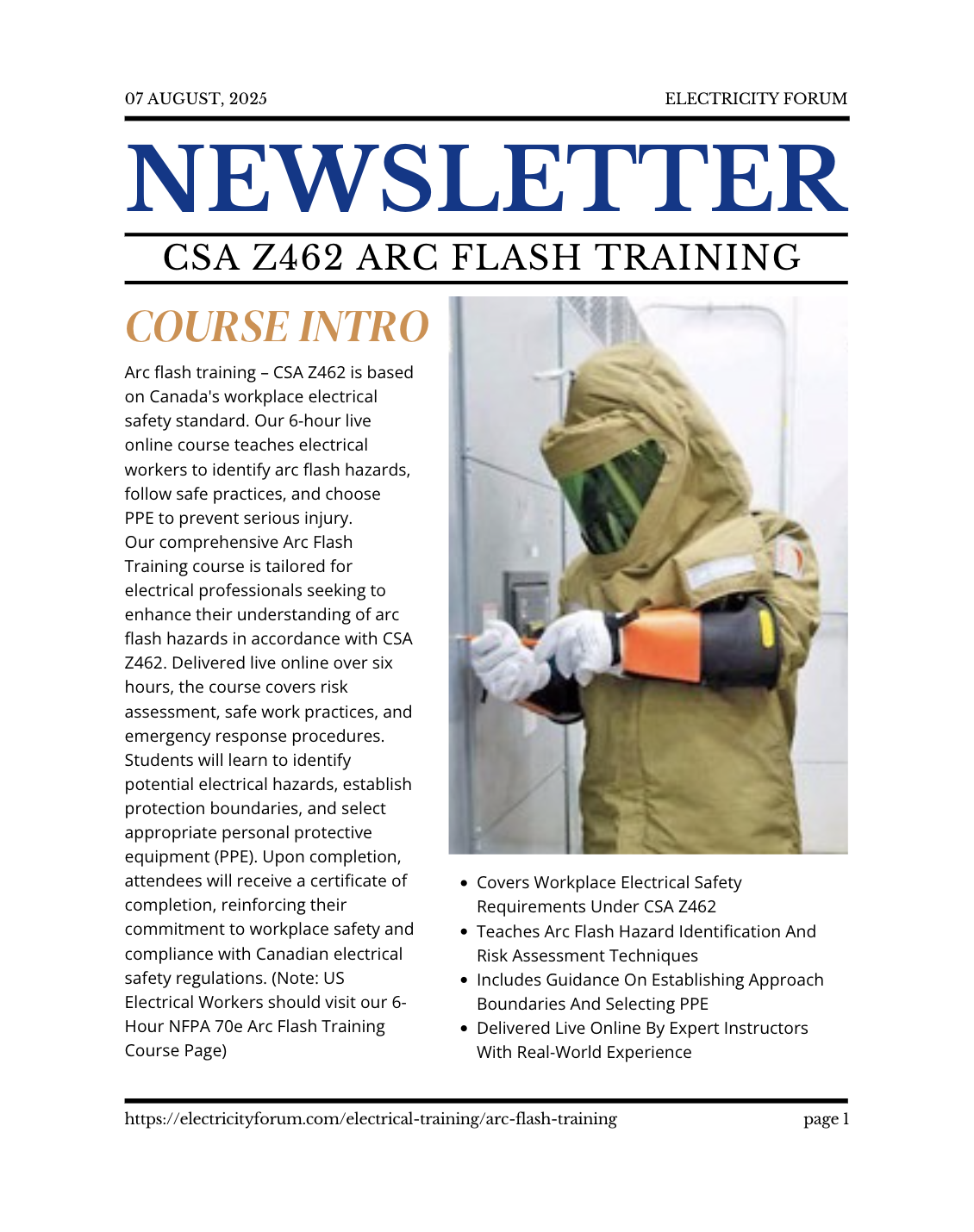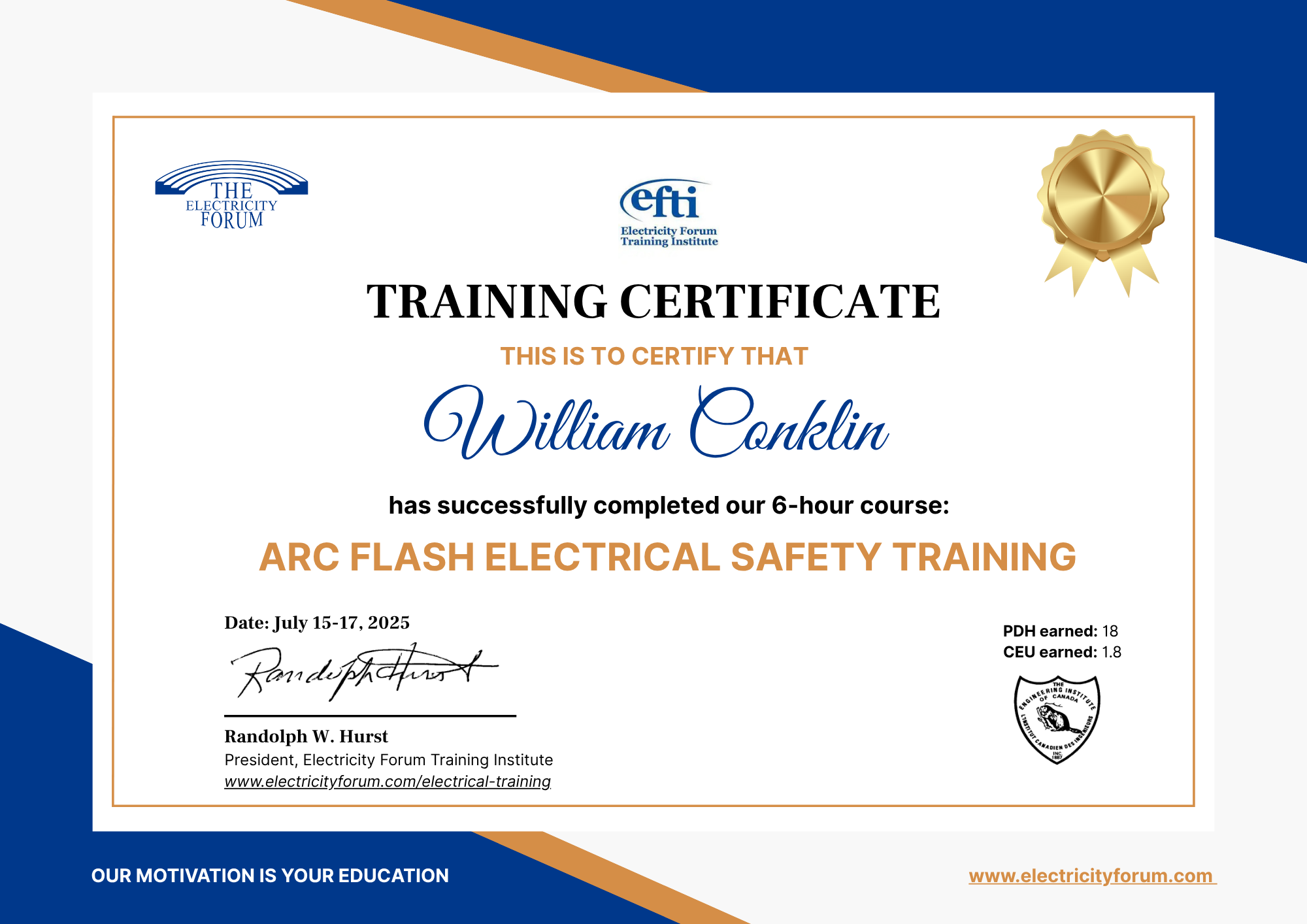Electrical Safety For EHS Managers provides essential training on hazard assessment, OSHA and NFPA 70E compliance, PPE selection, and safe work practices to protect employees from electrical shock, arc flash, and equipment hazards in industrial and commercial facilities.
What is Electrical Safety For EHS Managers?
-
Teaches hazard identification, risk assessment, and control procedures
-
Ensures compliance with OSHA and NFPA 70E electrical safety standards
-
Improves workplace safety culture through effective PPE and training programs
Our 6-Hour (1-Day) Electrical Safety Training for EHS Managers, Supervisors and Specialists training course provides a comprehensive overview of worker hazard awareness, regulatory compliance, risk assessment, Lockout/Tagout practices, and safety program management. Designed specifically for safety managers, EHS professionals, supervisors, and facility leaders, this course equips students with the knowledge and tools to properly oversee electrical safety training programs and practices, and support compliance with NFPA 70E, CSA Z462, and OSHA 29 CFR 1910 standards.
Course Themes
-
Managing the safety of Qualified and Unqualified workers under OSHA and NFPA 70E
-
Leadership responsibility for workplace hazard control
-
Risk assessment, LOTO program management, PPE oversight
-
Contractor safety management and multi-employer coordination
-
Regulatory compliance, auditing, documentation, and inspection readiness
-
Emergency planning and incident response
In addition to technical awareness, this electrical safety training course emphasizes leadership responsibilities in developing and maintaining safety policies that foster a culture of compliance and risk reduction.
This electrical safety training course complements our front-line courses — such as NFPA 70e Training, CSA Z462 Arc Flash Training, High Voltage Safety Training, Electrical Safety for Non-Electrical Workers, OSHA Lockout Tagout Training, and OSHA Electrical Safety Compliance — by offering EHS managers and supervisors the broader understanding necessary to lead successful electrical safety programs across their organizations by focusing specifically on program development, auditing, and management strategies. Graduates of this course will be fully prepared to lead safety initiatives, oversee the instruction of qualified workers, and maintain compliance with both OSHA and CSA safety regulations.
Electrical Safety Training - Learning Objectives
-
Understand the critical role of EHS managers and supervisors in safety leadership.
-
Distinguish between Qualified and Unqualified workers and manage their safety responsibilities.
-
Apply NFPA 70E, CSA Z462, and OSHA 29 CFR 1910 standards to workplace safety practices.
-
Develop and manage comprehensive Safety Programs, including risk assessments and safe work procedures.
-
Create and oversee PPE programs to protect workers from shock and arc flash hazards.
-
Support Arc Flash and Shock Hazard Awareness instruction for employees and contractors
-
Build and enforce effective Lockout/Tagout (LOTO) procedures and hazardous energy control programs.
-
Manage contractor and vendor safety compliance on multi-employer worksites.
-
Organize and maintain critical safety documentation, training records, and permits.
-
Conduct internal audits, identify gaps, and drive continuous improvement in safety performance.
-
Plan and coordinate emergency preparedness and response for incidents
How This Electrical Safety Training Course Differs from Our Electrical Safety Program Development Course
While both electrical safety training courses are designed to strengthen workplace leadership, this Electrical Safety Training for EHS Managers and Supervisors course provides a broader focus on regulatory compliance, risk assessment, Lockout/Tagout program management, and contractor safety coordination. In contrast, our Electrical Safety Program Development Course offers a deeper, one-day intensive specifically focused on writing, implementing, managing, and auditing an organization's formal safety program. Together, these courses provide complementary skill sets, enabling EHS professionals to lead both day-to-day practices and long-term program development with confidence.

















